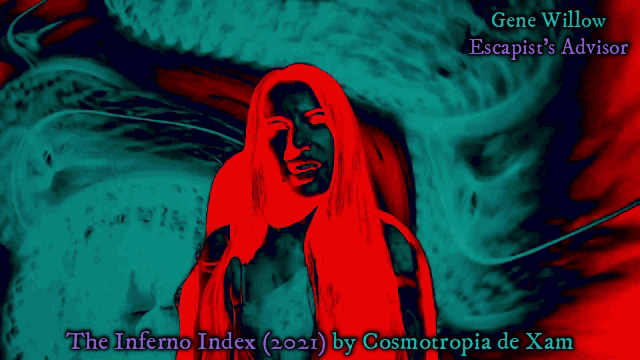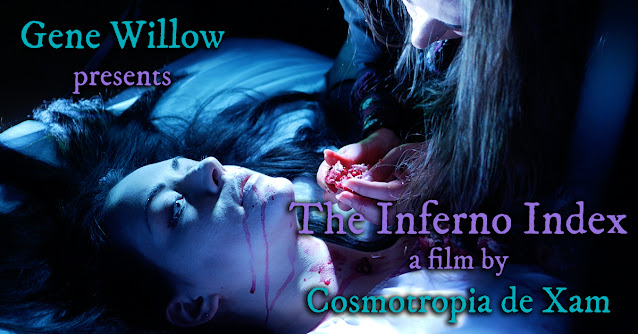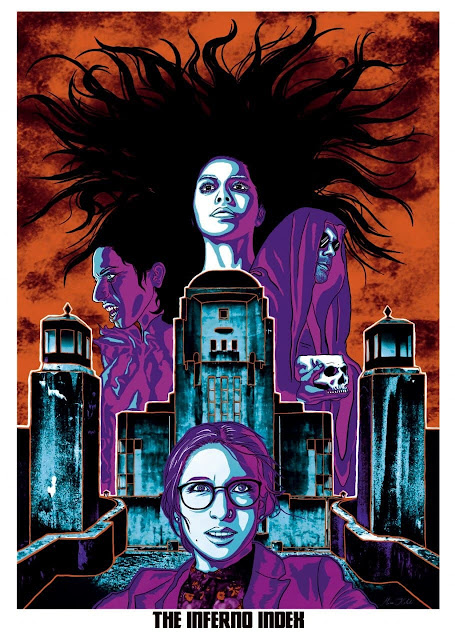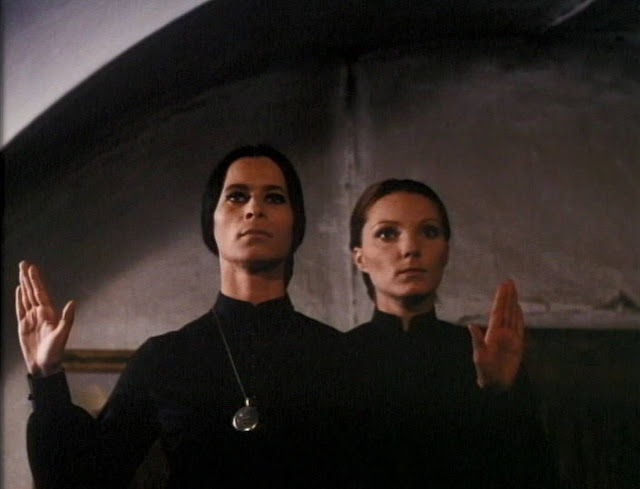The Inferno Index 2021 (Facts & Review of Cosmotropia de Xam's Film)
In this article I will tell you about the most recent film by Cosmotropia de
Xam — The Inferno Index released in March 2021.
I
will share facts about the film including Cosmotropia de Xam’s own comments
regarding the meaning of the plot and the filming process.
Let’s
get down to business.
Synopsis
As Cosmotropia de Xam himself notes, there are many possible interpretations of what is going on in the film. It depends on the viewer and their imagination. But one certain thing happening in The Inferno Index is that a girl Litha (Mira Kohli) meets a demonic entity (Marijana Mladenov), her colleague (Marcus Litwin), and other infernal beings, who transform Litha into a demonic entity through a series of mysterious supernatural rituals.
The beginning of the film makes me think of
Diabolique — a 2013 film by Cosmotropia de Xam
where a young girl is chased, captured, and initiated by a company of
vampires.
Similarly to other movies by Cosmotropia de Xam, The Inferno Index is a psychedelic art house film providing a hallucination-like experience to the viewer.
It’s officially labeled as an “art horror” movie, while in fact there is not
much from horror in it. The film immerses you in an occult-flavoured mystery
rather than tries to scare. There is no considerable violence. Traditional
horror attributes such as blood (without showing bleeding and injury) or
contact lenses (for the actresses’ demonic look) are rather used to create a
fantasy vibe and for symbolism or decoration purposes.
Visual Style and Locations
Scenes in The Inferno Index take place in several types of locations in
Germany, around Dusseldorf, and in the Netherlands. Unlike in other
films
by Cosmotropia de Xam (notably such as
Phantasmagoria), this time he couldn’t use any known historical filming sites from
cult classic European exploitation movies. While shooting The Inferno Index, the crew had to adjust to
limitations caused by the COVID-19 pandemic which made travelling
difficult.
Here is a quick overview of the scenes I find the most
impressive, among the rest.
The film starts with the urban setting
showcasing futuristic “sky trains” — a suspended public transportation system.
As Cosmotropia de Xam notes, without revealing the name of the city,
The city you see in the movie has a historical meaning since it was the
world's first city with a sky train.
In the video below, you can see how it looked back in 1902 at the
time when this system was newly built.
In one of the scenes, we see the main characters taking such a train and wearing masks inside, because of the COVID-19 pandemic. This makes me think that in decades from now, this detail will look like a historical artifact.
Another location is a deserted valley around a large, apparently abandoned, industrial building. This scene is made with a heavy use of filters making it look totally otherworldly: the action takes place beyond the real world, where Litha meets other supernatural entities.
Next, the story takes us to a tunnel with stone walls, where the demon girl and Litha are performing one of their occult rituals involving much classical style operatic singing by Marijana and screaming by Mira.

|
|
Marijana singing ritual occult opera while Mira prefers ritual occult
heavy metal. |
The most visually beautiful, in my opinion, scene, is the final one, filmed
indoors (with no visible interior, like beyond space). The image is based on
the combination of blue, red, and black colors.
Music
As Cosmotropia de Xam
noted in our interview,
Soundtracks to my films are mostly created during the editing process
and mostly by one of my music projects to have a
100% dense atmosphere. As most of the movies I made over the years
have more of a surreal or surreal / narrative structure, the atmosphere is
what is of the highest importance for me — much more important than telling
a story or having the perfect technical shot.
Indeed, one of the first things I noticed in this film is that it feels almost
entirely like a music video.
The score for
The Inferno Index was created by Lapis Exilis (mostly) and Cosmotropia
de Xam. Lapis Exilis is a post metal and electronic music project consisting
of Lapis Exilis himself and his collaborators. For this project, Lapis’
collaborators were Mira Kohli, Marijana Mladenov (the actresses playing the
main characters), Olga Mladenov (Marijana’s sister who recorded violin parts),
and Cosmotropia de Xam.
In most (or even all) of Cosmotropia de Xam’s previous films, scores mostly
consist of heavy electronic music (stylistically derived from the witch house
genre). This time, however, Lapis Exilis, who composed most of the score,
brought much electric guitar sound and his singing to
The Inferno Index. Some of the scenes have a dreamy post rock and post
metal feel.
However, much of the running time is still reserved
for Cosmotropia de Xam’s trademark heavy electronic sound.
The
soundtrack to The Inferno Index is available on Lapis Exilis’ Bandcamp:
Meaning
The Title
When I asked Cosmotropia de Xam about the meaning of the title
The Inferno Index, he referred to the definition of the word
index:
An alphabetical list, such as one printed at the back of a book showing
which page a subject, name, etc.
Cosmotropia de Xam adds:
Also a list of forbidden things.
The original working
title was Paradise Lost — another interpretation on the Garden of Eden
theme.
The Story
Below are Cosmotropia de Xam’s own comments on the meaning of
The Inferno Index. You may want to read this section
after watching the film to keep maximum room for your own imagination
that will do most of the work interpreting the plot.
The movie has different (depending on viewer) layers of experience. One of
them…The movie starts with a dream on the screen. Litha, one of the
characters, leaves the cinema and the dream and is followed by a demon and her
master and a different form but the same person from what she saw on the
screen. If she stayed for longer at the cinema, she would have seen the scene
we see at the end of the film. So it's also about prophecies and how you can
change prophecies.
The trains are decisions you make and how then
something will change — over the film you see more and more timelines / trains
crossing. The person who drags Litha though the streets is trying to change
her decisions and avoid the future…
Chapter 6 lays open that all
you have seen before was just a dream of the dreamer (even a dream within a
dream) and that she awoke her own demon who takes control over her and her
vision of paradise.
This is just one interpretation /
layer— you can see several more, like in a surreal painting.
You
can also interpret it as the transition of the world during a pandemic. Seeing
the fruit as medicine gives it another meaning.

|
|
Mira playing a psychedelic demon. |
Cast
Apart from Cosmotropia de Xam, five other people (according to the end titles)
worked on the film. Only one of them — Marcus Littwinn — had previously acted
in another movie by Cosmotropia. Lapis Exilis had also previously worked on
mastering albums. Apart from that, the team was new.
Cosmotropia
de Xam explains how he met the collaborators for
The Inferno Index:
Lapis Exilis is a befriended project and the actresses are singers from
that project — so all people lived nearby which made working during the
pandemic easier.
Let’s go over each person individually (except for Cosmotropia de
Xam himself: you can learn more about him
from our interview).
Mira Kohli
Mira plays the very main role in the film — the girl being followed by the demons and transformed into one.
Mira, as well as the other star, Marijana Mladenov, also plays in a later film — The House that Eats the Rabbit (2021) by Cosmotropia de Xam. Then, Mira appears as one of the two leads in Cosmotropia de Xam's 2023 movie — Space Necronomicon.
Apart from being an actress and
musician (member of Lapis Exilis and former singer of a progressive metal band
In Morpheus' Arms), Mira is also an artist.
Below is cover art for
The Inferno Index made by Mira. You can see more of her works on
Mira’s Facebook fanpage.
Marijana Mladenov and Olga Mladenov
Marijana Mladenov plays the Demon throughout the film and the Dreamer in the
final scene.
Before even watching the film, when I only saw lobby
cards with actresses’ names, I immediately understood who of the two girls
Marijana was — the one with Slavic appearance, obviously matching her
beautiful Slavic name.
Marijana is also a singer in Lapis Exilis.
Apart from that, she is a professional classical singer.
Here, on YouTube, you can see recordings of her operatic singing, TV interviews (in Serbian)
as well as projects in other genres.
Olga Mladenov is Marijana’s
sister who recorded violin parts for The Inferno Index’ score. Here is
a
video of them rocking together.
Lapis Exilis
Visually, Lapis Exilis makes one small appearance — in the scene showing the
Red Desert. He plays a Desert Ghoul, as is specified in the end titles. Apart
from that and the score, Lapis was one of the cameramen.
Lapis’
main project is his music band. Below are two of his music videos featuring
Marijana and Mira.
Marcus Littwin
Marcus Littwin has previously had one role in a film by Cosmotropia de Xam —
the Motorbiker in Delirium (2015). Considering this experience and
Marcus’ passion for vehicles, in The Inferno Index, he was also given
an automotive role — the Demon’s personal driver.

|
|
Marcus Littwin — a badass driver at the service of the forces of
evil. |
Apart from that, Marcus appears in one or two other scenes and participates as
one of the cameramen.
Interestingly, just like in
The Inferno Index Marcus plays a person, his two little daughters —
Janet and Larissa — play children in Metamorfosia, a 2014 film by Cosmotropia de Xam.
Besides Cosmotropia de Xam’s projects, Marcus
was also a cinematographer in a documentary
Die X-Männer schlagen zurück (2012) by Reginald Ginster featuring
Gianfranco Parolini, Tony Kendall, and Brad Harris.
Filming
As for the filming process, here is what Cosmotropia de Xam told me in
our recent interview:
It's filmed and edited in 4K with additional camera work by Lapis Exilis.
We filmed it from lockdown to lockdown around summer of 2020 in the
Netherlands and Germany. The filming process during the pandemic situation
was a little bit tougher in planning. But finally we finished filming the
material around Halloween 2020, before the second lockdown was into
action.
This is a project that took us five months to film.
Normally, I do movies in one week or two, focused. But in the present
situation, it's all super weird. Here we are now allowed to meet at maximum
five people from two flats. It's very surreal.
Where to Watch The Inferno Index
The Inferno Index is available:
- for streaming on Vimeo
- on BluRay+R, DVD, VHS, and Betamax in various beautiful designs on Phantasma Disques’ Bigcartel.
I created this blog for like-minded people with weird taste for unpopular, obscure, and sleazy films and music. If you feel our tastes are similar, let's be email friends. You can also reach out to me if you need help in finding any rare film or music mentioned in by blog.









Comments
Post a Comment